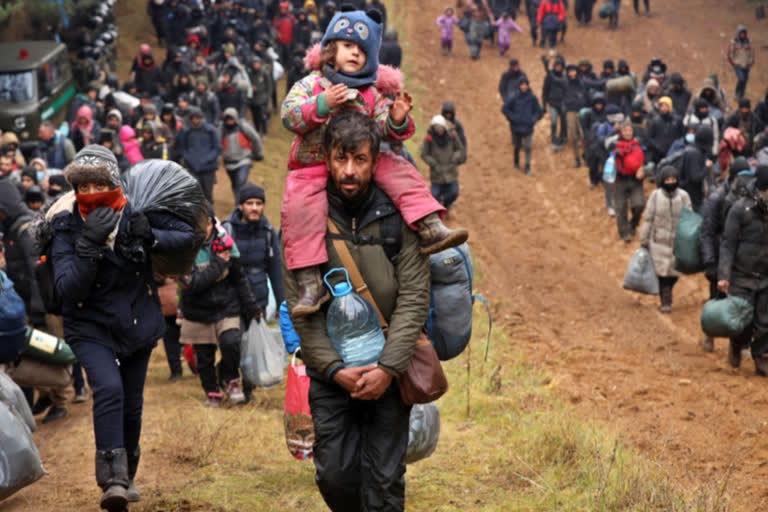Brussels: The European Union on Monday ratcheted up pressure on Belarus by agreeing to slap sanctions on airlines accused of helping President Alexander Lukashenko to wage a "hybrid attack" against the bloc using migrants, as tensions mounted on the Polish and Lithuanian borders.
Up to 4,000 migrants are stuck in makeshift camps in freezing weather after Poland reinforced its border with Belarus with 15,000 soldiers, in addition to border guards and police. At least nine migrants have died. Many of them want to head further west, often to Germany.
Polish authorities said Monday that Belarusian services had led a large group to a border crossing with Poland and made them believe they would be transported by bus to Germany. Polish police say they are broadcasting messages across the border telling the migrants that "they have been deceived."
Meanwhile, Lithuanian officials said Monday it was seeing a rising number of attempts by migrants to cross its border from Belarus, but the situation on the border was under control.
"They try entering from many other places which previously were not used," Interior Minister Agne Bilotaite told reporters.
The 27-country EU has already imposed four sets of sanctions on Belarus authorities and senior officials over the disputed election in August last year that returned Lukashenko to office and the security crackdown on peaceful protesters that followed.
Also read:Russia sends nuclear-capable bombers on patrol over Belarus
The EU is preparing a fifth lot, and on Monday the bloc's foreign ministers extended the scope of those measures to add airlines, travel agents and others accused of helping to bring migrants to Minsk.
"Today's decision reflects the determination by the European Union to stand up to the instrumentalization of migrants for political purposes. We are pushing back on this inhuman and illegal practice," EU foreign policy chief Josep Borrell said in a statement.
EU headquarters said the bloc will now be able to target individuals and entities organizing or contributing to activities by the Lukashenko regime that facilitate illegal crossing of the EU's external borders. A list of those to be hit by the asset freezes and travel bans is expected to be finalized in coming days.
The EU believes Lukashenko began luring migrants to Belarus in recent months as part of a retaliatory attack meant to destabilize the bloc. The EU has been deeply divided over how to manage migrants since well over 1 million people entered in 2015.
Also Monday, the United Arab Emirates banned travellers from several Middle Eastern countries from boarding flights to Belarus, cutting off one of the last major air routes for would-be migrants there. Thousands of people from around the Middle East, many of them Iraqis and Syrians, have been trying to cross into the EU this year through a backdoor opened by non-EU member Belarus.
Lukashenko brushed aside the threat of fresh EU measures.
"We will defend ourselves. That's it, there's nowhere to retreat further," he was quoted as saying by the state news agency Belta.
